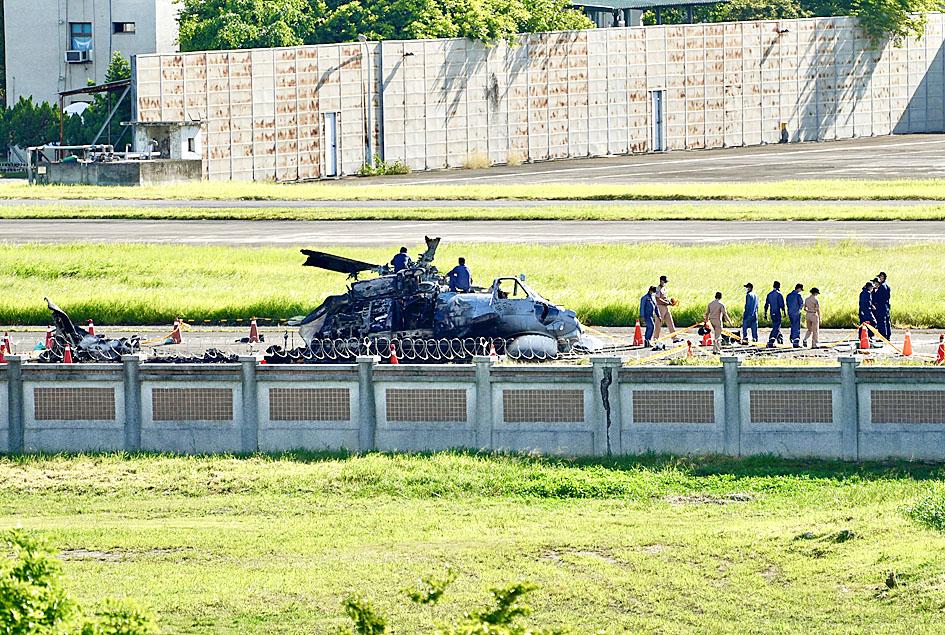A tail rotor failure might have caused a Taiwanese Navy S-70C anti-submarine helicopter to crash in Kaohsiung during a training mission on Wednesday, a preliminary inquiry has shown.
The aircraft “made a hard landing” on the tarmac of the Kaohsiung Zuoying naval base on Wednesday at about 4pm, injuring all four crew members, with one in critical condition, navy Chief of Staff Vice Admiral Chiang Cheng-kuo (蔣正國) said at a news conference yesterday.
Accounts from air traffic controllers and the helicopter’s pilots pointed to a tail rotor failure, Chiang said, adding that no other mechanical problems were encountered before the incident.

Photo: CNA
An official cause of the crash has not been determined pending investigation, he said.
The crew chief, surnamed Liu (劉), suffered the most severe injuries and is in hospital in critical condition, Ministry of National Defense Medical Affairs Bureau official Chen Yuan-hao (陳元皓) said.
Liu sustained second and third-degree burns on 95 percent of his body, and has a subarachnoid hemorrhage — bleeding between the brain and its surrounding membrane, Chen said.
The other crew members are in stable condition after being treated at a military hospital in Kaohsiung, including a chief inspector surnamed Kuo (郭), who has second and third-degree burns on 20 percent of his body, Chen said.
The pilot, surnamed Chen (陳), and co-pilot, surnamed Cheng (鄭), have relatively minor injuries, such as rib fractures and lacerations to the face and limbs, he said.
The navy said the helicopter was severely damaged, and it would assess whether repair is possible.
The crash was the fourth military aircraft accident this year, following crashes of an F-16 fighter, a Mirage 2000 fighter and an AT-3 trainer, resulting in the deaths of two pilots.
Taiwan’s Naval Antisubmarine Aviation Group has 18 S-70Cs, which have been in service since 1991, including the one that crashed on Wednesday.
Three other S-70C-related incidents that resulted in severe damage to the aircraft occurred in 1994, 2005 and 2008.

Taiwan has received more than US$70 million in royalties as of the end of last year from developing the F-16V jet as countries worldwide purchase or upgrade to this popular model, government and military officials said on Saturday. Taiwan funded the development of the F-16V jet and ended up the sole investor as other countries withdrew from the program. Now the F-16V is increasingly popular and countries must pay Taiwan a percentage in royalties when they purchase new F-16V aircraft or upgrade older F-16 models. The next five years are expected to be the peak for these royalties, with Taiwan potentially earning

STAY IN YOUR LANE: As the US and Israel attack Iran, the ministry has warned China not to overstep by including Taiwanese citizens in its evacuation orders The Ministry of Foreign Affairs (MOFA) yesterday rebuked a statement by China’s embassy in Israel that it would evacuate Taiwanese holders of Chinese travel documents from Israel amid the latter’s escalating conflict with Iran. Tensions have risen across the Middle East in the wake of US and Israeli airstrikes on Iran beginning Saturday. China subsequently issued an evacuation notice for its citizens. In a news release, the Chinese embassy in Israel said holders of “Taiwan compatriot permits (台胞證)” issued to Taiwanese nationals by Chinese authorities for travel to China — could register for evacuation to Egypt. In Taipei, the ministry yesterday said Taiwan

‘LIKE-MINDED PARTNER’: Tako van Popta said it would be inappropriate to delay signing the deal with Taiwan because of China, adding he would promote the issue Canadian senators have stressed Taiwan’s importance for international trade and expressed enthusiasm for ensuring the Taiwan-Canada trade cooperation framework agreement is implemented this year. Representative to Canada Harry Tseng (曾厚仁) in an interview with the Central News Agency (CNA) said he was increasingly uneasy about Ottawa’s delays in signing the agreement, especially as Ottawa has warmed toward Beijing. There are “no negotiations left. Not only [is it] initialed, we have three versions of the text ready: English, French and Mandarin,” Tseng said. “That tells you how close we are to the final signature.” Tseng said that he hoped Canadian Prime Minister Mark Carney

POSITIVE DEVELOPMENT: Japan and the US are expected to hold in-depth discussions on Taiwan-related issues during the meeting next month, Japanese sources said The holding of a Japan-US leaders’ meeting ahead of US President Donald Trump’s visit to China is positive news for Taiwan, former Japan-Taiwan Exchange Association representative Hiroyasu Izumi said yesterday. After the Liberal Democratic Party’s landslide victory in Japan’s House of Representatives election, Japanese Prime Minister Sanae Takaichi is scheduled to visit the US next month, where she is to meet with Trump ahead of the US president’s planned visit to China from March 31 to April 2 for a meeting with Chinese President Xi Jinping (習近平). Japan and the US are expected to hold in-depth discussions on Taiwan-related issues during the